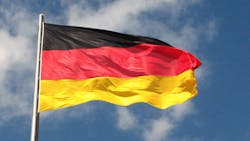German Industrial Orders Disappoint in September
[WIESBADEN, GERMANY] Industrial firms in Germany, Europe's largest economy, saw an unexpected fall in new orders in September, official data showed on Monday, pointing to weaker performance in the months ahead.
Companies saw order books shrink by 0.6% compared with August, correcting for price, seasonal and calendar effects, the federal statistics office Destatis said in preliminary figures.
Analysts surveyed by Factset had predicted growth of 0.4% for the last month of the third quarter.
The drop in new business was driven by domestic demand, with orders within Germany's borders falling by 1.1%, while orders from abroad fell back by 0.3%.
Lower foreign demand was driven by neighboring eurozone countries, whose orders fell sharply at 4.5%, while the reading for the rest of the world grew by 2.5%.
Firms selling producer goods and consumer goods were both able to increase their orders by 0.5%, while capital goods makers recorded a 1.6% fall driven by much lower demand in the eurozone.
The overall fall in orders was mostly due to a lack of new large contracts, Destatis said, noting that if those were excluded, orders grew by 1.0% overall in September.
The statistics office also released revised data for August on Monday, showing orders grew slightly slower than previously reported.
Looking across the whole third quarter, "new orders again perked up slightly," with 0.5% growth compared with April to June, the economy ministry said in its own statement.
"Brightening in relevant indicators points to some degree of pick-up in the industrial sector as the year goes on," the officials continued.
Some recent data from the German economy does point to further growth coming down the line, with both inflation and business confidence hitting two-year highs in October.
But consumer confidence has been buffeted by bad news from abroad and weak global growth.
"The initial relief after the Brexit shock has now given room for realism" in the industrial orders figures, analyst Carsten Brzeski of ING Diba bank said.
Growth in the indicator had been close to flat on average over the first nine months of 2016, he pointed out.
"It is hard to see how the German industry can shift to higher gear" without stronger growth in orders, Brzeski added.
Copyright Agence France-Presse, 2016
About the Author
Agence France-Presse
Copyright Agence France-Presse, 2002-2025. AFP text, photos, graphics and logos shall not be reproduced, published, broadcast, rewritten for broadcast or publication or redistributed directly or indirectly in any medium. AFP shall not be held liable for any delays, inaccuracies, errors or omissions in any AFP content, or for any actions taken in consequence.
